MIT's 4D-Knit Dress changes shape in response to heat
Massachusetts Institute of Technology researchers and fashion brand Ministry of Supply have produced a "4D-knit dress", using heat-activated yarn that allows its shape and fit to be altered in an instant.
The project builds on the idea of 3D knitting, where textiles are knitted as three-dimensional shapes rather than flat sheets that have to be cut and sewn together to make a garment.
The fourth dimension represents time, as the 4D Knit Dress is knitted in a basic tube shape but can later have its form altered through the application of heat via a programmed robot arm.
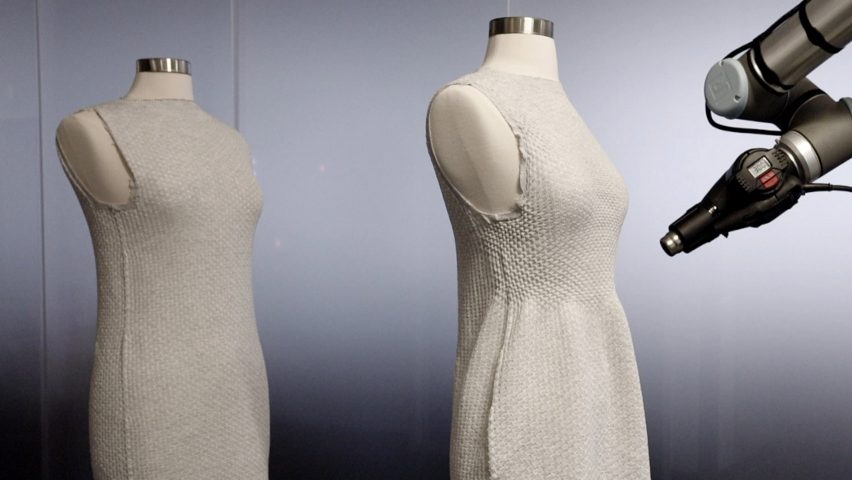
This might mean changing its shape to anything from a form-fitting sheath dress to a voluminous bubble dress, or it can mean making small tucks to produce a fit perfectly customised to an individual's body. The process can even create details like ruffles or ruching.
Researchers from the Self-Assembly Lab at the Massachusetts Institute of Technology (MIT), which is behind the project, say the 4D-Knit Dress is a more sustainable alternative to traditionally produced clothing that cuts down on the waste from both manufacturing and excess stock.
Self-Assembly Lab founder and co-director Skylar Tibbits told Dezeen that producing items of clothing in too many sizes and too many styles was both costly and unsustainable for the fashion industry.
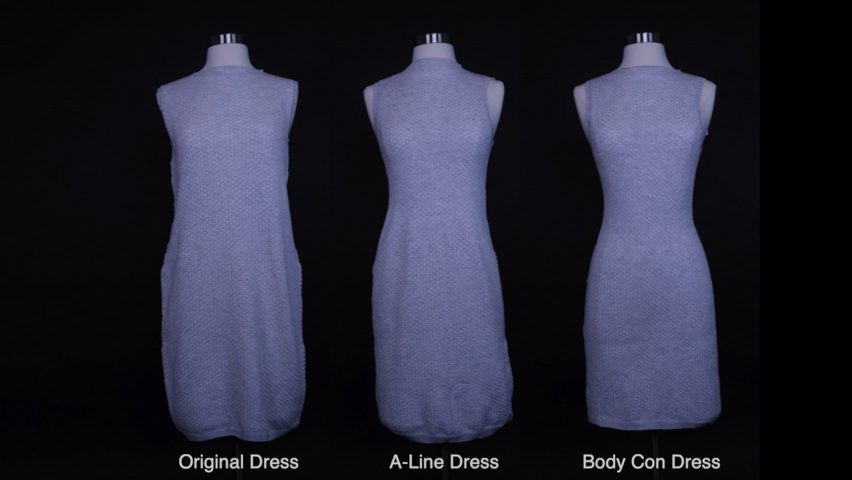
"By having one dress that can be customised for fit and style, it can be perfectly tailored to the individual while being more sustainable and adaptable to changes in season, style or inventory," he said.
The heat-activated yarn was developed by the Self-Assembly Lab and is made of nylon. It is mixed with a soft yarn that blends viscose and polyester in the weave of the dress.
As well as the yarn, the knit structure is key to the dress, guiding the way the fabric transforms.
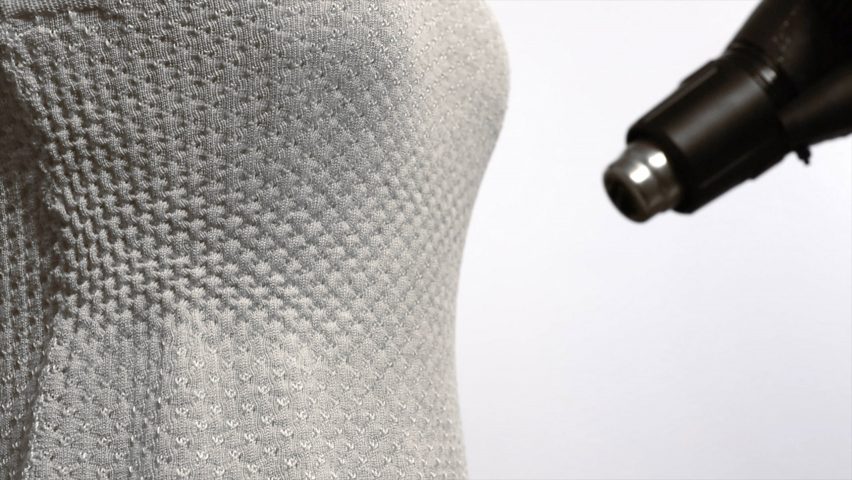
"The material responds to temperature and shrinks while the knitted structure guides the direction of the transformation and allows for different zones or behaviours across the garment," said Tibbits.
"We have worked for a number of years to develop precise directional control of the textile transformation as well as specific amounts of transformation at different temperature ranges."
To activate the alterations, the Self-Assembly Lab and Ministry of Supply use a six-axis robot – the same kind used on factory floors for welding or assembly.
In Ministry of Supply's Boston flagship store, where the dress was on display, the robot arm moved on a programmed route around a mannequin, echoing the movements of a tailor adding pins and tucks.
The fashion brand has an ongoing partnership with the Self-Assembly Lab, which has run for nearly a decade, with the researchers focusing on the technical aspects of the project and Ministry of Supply leading on design and in-store strategy.
After developing the fibre, yarn, knitting and activation processes together, the collaborators applied the technology during the pandemic to rapidly produce face masks personalised to fit individual faces.
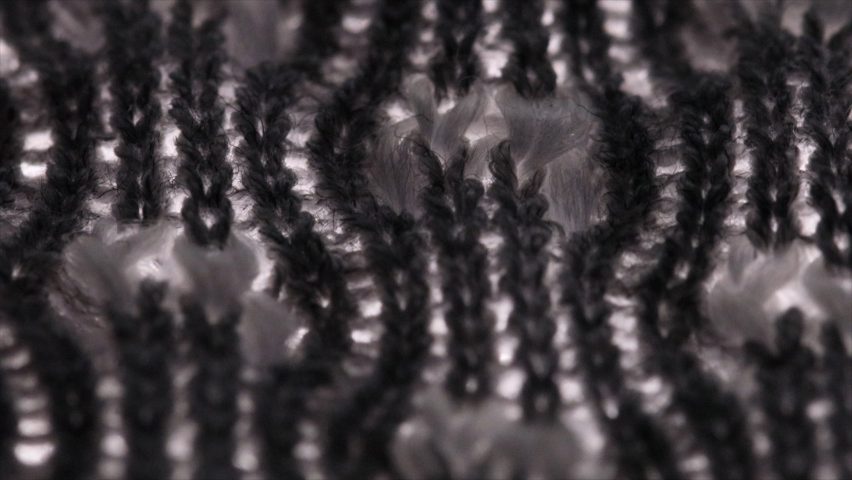
The 4D-Knit Dress was made in a limited product run of prototypes and displayed at the Ministry of Supply store.
The Self-Assembly Lab says the dress maintains its softness, stretch and resilience after heating, and that the production process is efficient and scalable. The dress is also machine washable on cold.
Ministry of Supply has begun to scale up the process of manufacturing the 4D-Knit Dress with its industrial knitting partners so it can be sent to more stores.
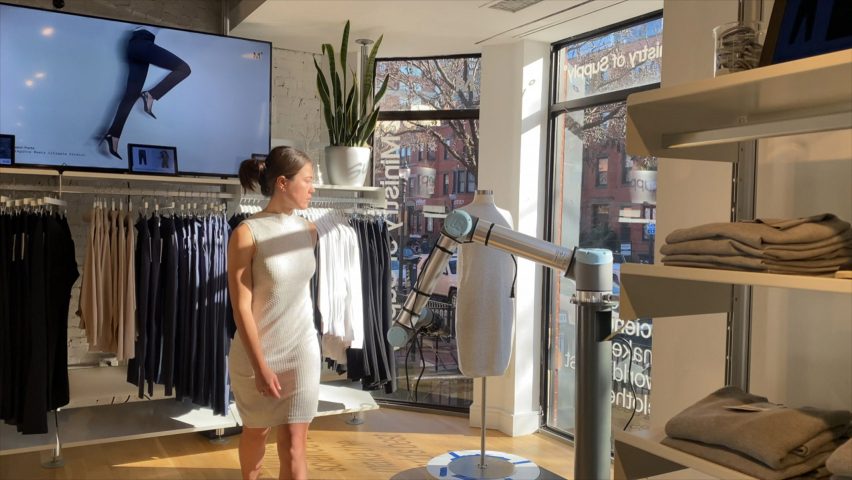
"In light of the supply-chain challenges of the past several years, we're finding an increased need to do 'late-stage differentiation' in our inventory," said Ministry of Supply co-founder and president Gihan Amarasiriwardena.
"That allows us and other brands to adapt to demand, changes in size curves and seasonality – which 4D Knitting allows."
Ministry of Supply was founded by three MIT students in 2012 to apply new technologies to fashion. Its previous designs have included a self-heating smart jacket.
The Self-Assembly Lab has previously developed innovations such as Rapid Liquid Printing – a way of manufacturing furniture in minutes by extruding material into gel – and a material called Active Auxetic, which tightens in cold weather to keep in warmth.
Project credits
MIT Self-Assembly Lab
Researchers: Sasha Mckinlay, Danny Griffin, Lavender Tessmer, Natalie Pearl, Sofia Chen, Susan Williams, Agnes Parker
Co-directors: Jared Laucks, Skylar Tibbits
Ministry of Supply
Design director: Jarlath Mellett
Design and development manager: Alessandra Vasi
Senior manufacturing engineer: Ryan Connary
Co-founder and president: Gihan Amarasiriwardena